In November, Texans will go to the polls to decide if Republican Ted Cruz will serve a second term in the U.S. Senate or be replaced by Democrat Beto O’Rourke. Each candidate joins us to talk about their current legislative priorities – and why he should represent Texas on Capitol Hill.
On renegotiating NAFTA …
Cruz: “Opening up those Mexican energy markets would produce thousands of high-paying jobs in Mexico – that’s good for helping grow the Mexican middle class. But naturally the place they’d turn for expertise to develop that oil and gas is Texas. It would produce thousands of high-paying jobs in Texas. That’s a win-win.”
O’Rourke: “We have room for improvement in elevating the U.S. worker and her competitiveness, and I think a great opening opportunity is elevating the pay and conditions for the Mexican worker … When people in Juarez and throughout Mexico can organize the way that we can in the United States for better working conditions and wages, we are going to see wages go up in Mexico, which puts the U.S. worker at a greater competitive advantage and ensures that we can compete for more of those factory jobs, more of those manufacturing jobs, more of those export jobs that we should rightly demand be created here in the U.S.”
On a wall along the U.S.-Mexican border …
Cruz: “I ask the border-patrol agents, I ask law enforcement, ‘You tell me, do walls work? You’re doing this every day.’ Consistently, the answer I get is, ‘Yes, walls make a difference.’ … What is critical to stopping illegal immigration is the time between detection and apprehension. When you monitor and detect someone crossing the border illegally – whether it’s a narcotics trafficker or someone trafficking human beings – the time between when you spot them and when can get border-patrol agents to apprehend them, if they can blend into a population quickly they disappear. What a wall does is it slows them down long enough that the border-patrol agents have time to apprehend them. And so consistently the answer I hear from law enforcement is, ‘Yes, that is a very helpful tool in stopping illegal immigration’.”
O’Rourke: “For those who’ve studied it, it seems to have a negligible effect on total number of crossing attempts. It seems to increase the likelihood of death or suffering. And for all the cost both in resources, in opportunity and in taking U.S. property from U.S. property owners – because as you probably know, the wall is not built on the international boundary line, which is the Rio Grande River. It’s built miles into the U.S. on private property. For all that cost, it’s not having the intended effect, and it’s just a real bad value for the U.S. tax payer.”
On separating detained parents from their children …
Cruz: “There’s a reason why under the Obama administration that often didn’t happen. Because when they apprehended people here illegally, they just let them go. And when you let them go, you didn’t separate children from parents. You know, you think about it, if someone gets arrested for a crime – let’s say an American citizen … you’re separated from your children – you’re put in prison. If you’re the only caregiver for that child, then you’ve got to find alternative care for those children. … This is an issue that I think the media has largely constructed, because what’s shifted is that the Trump administration is endeavoring when people cross illegally to arrest them, not to let them go. And so if they have kids, you know there’s actually a court order that prevents keeping the kids with the parents when you put the parents in jail. So when you see reporters, when you see Democrats saying, ‘Don’t separate kids from their parent,’ what they’re really saying is, ‘Don’t arrest illegal aliens’.”
On environmental regulations possibly costing Texans jobs …
O’Rourke: “The answer cannot be that jobs trump health. Or that we neglect our obligation to the generation that follows this one and the understanding that if this planet warms another two degrees Celsius, that we’ll no longer be talking about storms ravaging Houston and 58 inches of rain being dumped on southeast Texas. It’ll be a question of can people any longer live in Houston and Port Arthur and Beaumont and Rock Port and Port Aransas.”


